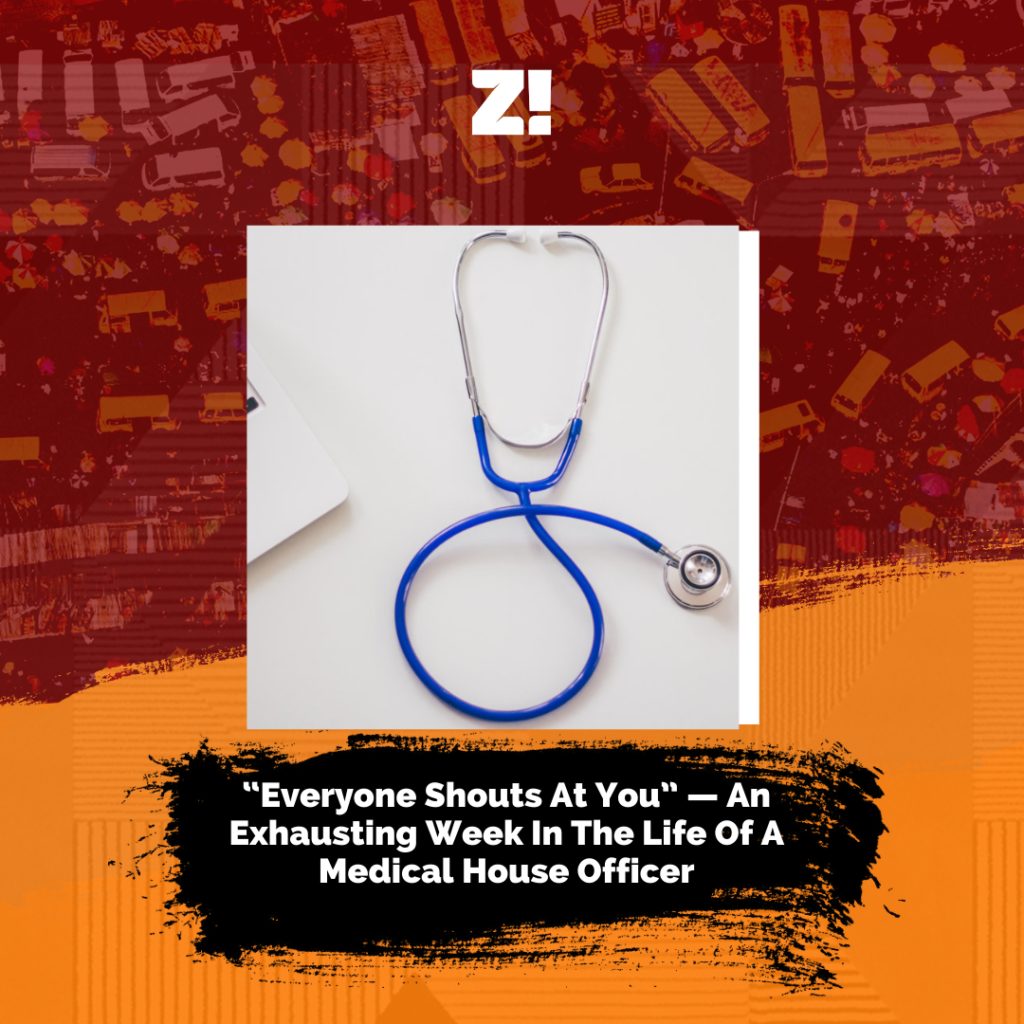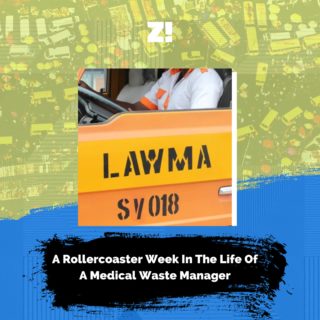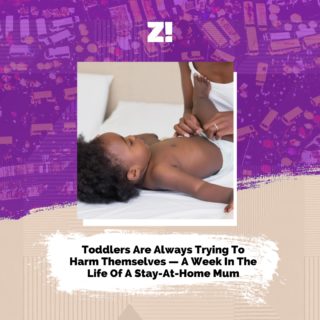“A Week In The Life” is a weekly Zikoko series that explores the working-class struggles of Nigerians. It captures the very spirit of what it means to hustle in Nigeria and puts you in the shoes of the subject for a week
The subject of today’s “A Week In The Life” is a medical house officer. House officers are freshly graduated doctors completing a one-year mandatory work program [called house job] for more hands-on experience. Our subject tells us about not getting enough sleep, being owed salaries and how the house job experience contributes to doctors leaving the country.

MONDAY:
The thing about being a house officer is that there’s no wake-up or sleep time — you need to be awake whenever the hospital calls you — continuously for one year. You have to find time in between work to get some sleep.
On a day like today where I managed to sleep before 12 a.m. and nobody called me through the night —which is rare — I wake up around 6 a.m. I pray for a bit. I check my phone to see if anyone from the hospital has called me, and I sigh in relief when I meet an empty screen.
I have my bath at 6:30 a.m., wear my clothes, and I’m off to the ward by 6:55 a.m. It takes me twenty minutes to get to the ward from the medical officers quarters, and I arrive at 7:15 a.m.
As the most junior doctor in the unit, I start my day by administering medications to all the patients — sometimes as many as 31 patients to one house officer — on the ward. In between, I have to clerk, document and ensure that no patient died over the night or is dying. I’m also somehow miraculously expected to do all these tasks before the “official” resumption time of 8 a.m.
On paper, ward rounds start at 8 a.m., but because nobody cares about the time of a house officer, the senior doctors stroll in whenever they want. Today, they arrive a few minutes to 9 a.m., and I’m put on secretary duty. My job during the round is to write down things like: “Patient seen.” “Carry out xx test.” “Patient doesn’t have money.”
After a while, I zone out.
It’s afternoon by the time we’re done with the rounds. It sucks, but I’ve been assigned one of the most ghetto tasks — mop ups. My bosses have left me to figure out how to run the tests the patients need. One patient needs an X-ray, another needs blood, and someone needs to see a specialist team.
My eyes are starting to turn, so I sneak off for lunch.
Post-Lunch: I ran some tests. Argued with a patient relative over buying of medications. Begged another patient’s relative to kindly run some tests. Survived.
It’s 6 p.m. when I finally catch a break. I can’t rest for long because it’s time to administer evening medications to the patients. It takes me an hour and thirty minutes. I leave the ward dragging my feet in search of dinner and maybe a shower or a nap. I’m barely at my quarters before I get a call from the Accident and Emergency unit— there’s a patient gasping for air. I grudgingly turn back. My long day is about to get even longer.
TUESDAY:
Theatre days are a whole new struggle. You have to go to the blood bank to “fight” for blood the night before major surgeries. Your job is to beg the scientist to keep at least two to three pints of blood for your patient. Then your Senior Registrar [SR] will call you at 4 a.m. to go to the blood bank and ensure that your patient’s blood is ready.
This is where it gets tricky.
You’ll hear either one of two things — your patient’s blood is ready or they gave out the blood overnight because of scarcity. If you hear the latter, that’s the beginning of your problems because your S.R is just going to shout at you for something that’s not your fault. If you’re lucky and you get blood, you move on to stage two, which is carrying the unit bag. This contains sutures and other equipment needed for surgery. If your village people are with you and you fall under the general surgery unit, your unit bag can be as heavy as a small adult.
I sincerely do not recommend.
The next step is to carry the bag to the theatre and prep your patient around 7 a.m. The surgery may not start until 10 – 11 a.m. and before it starts, it’s the house officers job to run around for whatever the patient needs or may be missing from the bag. During the surgery, your role is to run random errands like fetch heated normal saline or pass equipment.
Your role is to also get shouted at. Everybody shouts at you — from the porters to the nurses to your senior colleagues. The house officer is fair game for everyone’s frustrations.
After surgery, the house officer’s job consists of waiting in the recovery room to monitor the patient’s vitals every twenty minutes and relaying this information to your oga real-time. After about four hours, and if vitals are stable, you may then be either allowed to leave or ordered to wait until the patient is transferred to the ward. Unending problem everywhere.
I’ve come to a conclusion: house job is just one long year of similar stressful days repeated over and over again.
WEDNESDAY:
By some miracle, I have a few hours of “free” time today. However, I’m too worried to relax because I fear that the hospital can call me at any time. Ever since I started my house job, I get a mini-heart attack anytime my phone rings. I’m always worried that something has happened and they need me in the ward.
If I can get a few hours of uninterrupted sleep, I’ll be fine. Is that too much to ask for?
THURSDAY:
The most challenging unit for me is the Accidents and Emergency [A/E] unit. It’s stressful witnessing the lived experiences of patients. Some patients come in terrible states after being mismanaged by quacks for Typhoid and Malaria, which is an illness that doesn’t exist.
I hate the phrase Typhoid and Malaria.
By the time the patients get to our hospital, they’re already in critical condition and there’s not so much we can do. To worsen their case, they have to battle mosquitoes, hard examination beds, and no admission bed space at the A/E. Some patients come to the hospital with only a thousand naira. Where do you start helping them from? It sucks because there’s no insurance and all payment is out of pocket.
I’m tired of losing patients to things they don’t need to die for. At the end of the day, I’m only one house officer managing a big emergency room.
This silent struggle is why I get sad when patients beat up doctors. Half the time, I want to scream, “See how Nigeria is messing both of us up. I too am a victim of the system.” It’s ironic that you’re beating me up when I’ve not been paid in months, and I also haven’t slept well in days.
Today, I got a message on our house officers group chat: “Violent relative in the ward. The person has broken examination tables and chairs and promised to kill any doctor in sight.” That was my cue to take off my ward coat, gingerly wrap it in my bag and sneak into the call room to hide. For a few minutes, I was not a doctor. I was just a baby girl trying to live long enough to enjoy the salary she slaved for.
FRIDAY:
Today I’m thinking of how house job completely erases the possibility of staying back for many doctors. And it’s because of many little rubbish like not having sample bottles to take blood samples, or being owed salary and still being expected to show up. Is it the call rooms with rats as landlords? What of overnight call food which is definitely not fit for human consumption? Nobody cares about the house officer.
I’ve left them to their rubbish. In the middle of house job, I wrote IELTS and told God: “I’ll not die in this country.” I also wrote PLAB 1 exams as the first step of japa.
In my 500 level, I had the privilege to practice clinical medicine abroad, where it works, and trust me it’s sweet. Forget all the dragging doctors get on Twitter, medicine is a noble profession. Doctors are badass and it’s not beans. I know that if I stay in Nigeria I’ll never get that feeling of fulfilment. Anyone that has seen the miracles of medicine where the system works will always want that feeling. In addition to that nice feeling, the money also correlates.
I’m not ashamed to say that my ideal future involves a shit load of money. I have dreams of owning a house in the countryside, running a small yoghurt shop as a hobby and being a plant mom. I’ll also throw in a little travelling and some random rich people’s activities in the mix.
If I stay back to practise medicine in Nigeria, I fear that I may never achieve those dreams.
Check back every Tuesday by 9 am for more “A Week In The Life ” goodness, and if you would like to be featured or you know anyone who fits the profile, fill this form.
COMPONENT NOT FOUND: donation

 (@drpenking)
(@drpenking)  (@InvertedMrRobot)
(@InvertedMrRobot) 







